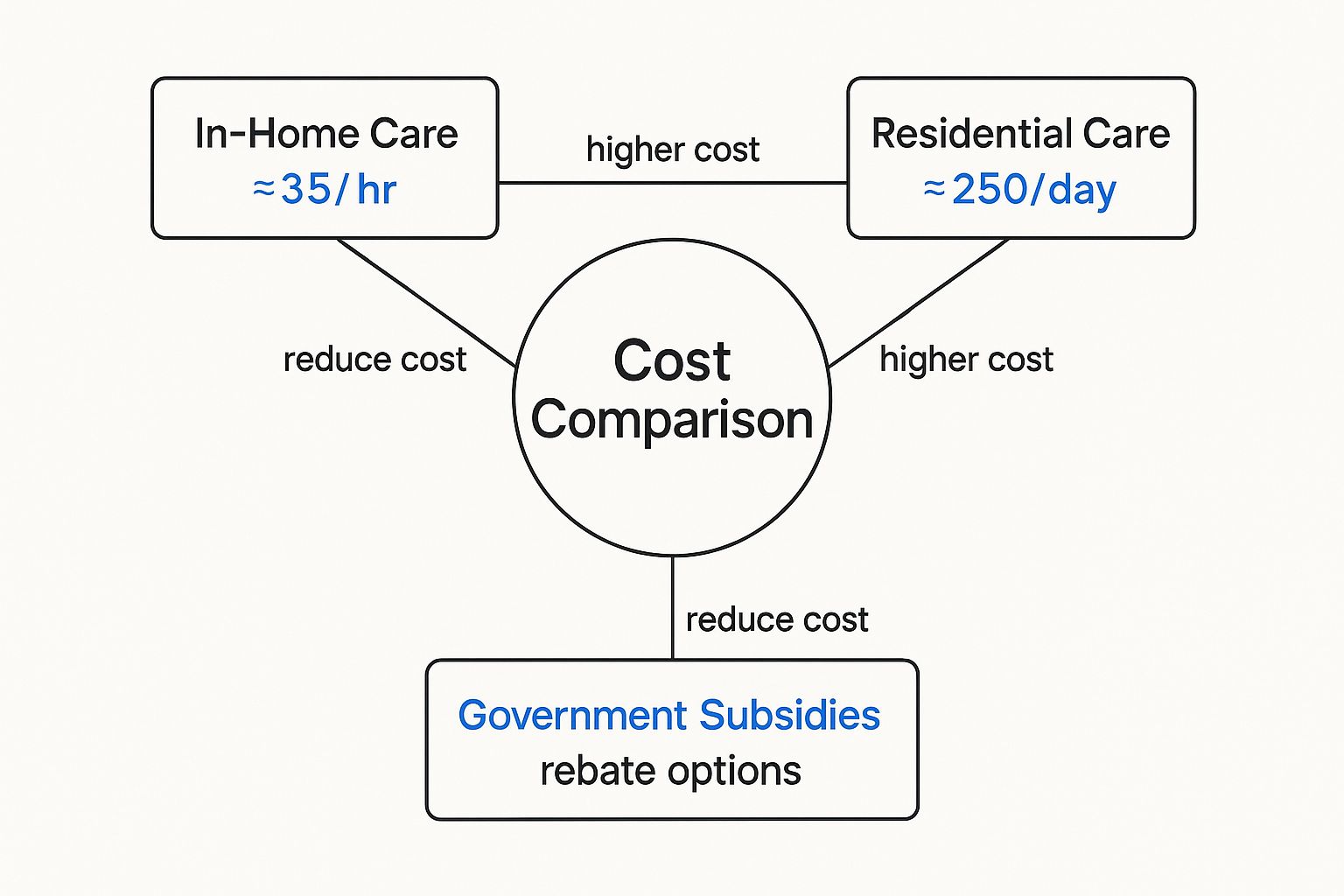Finding In Home Care Adelaide A Practical Guide

Starting the search for in-home care in Adelaide can feel like a huge step, but it’s really about reclaiming independence and ensuring you or your loved one can thrive in the place you feel most comfortable: home. It’s about getting personalised support that fits your life, not the other way around. This guide is here to help you navigate the options available right here in Adelaide.

Understanding Your In-Home Care Options in Adelaide
When you first start looking into in-home care, it's easy to feel a bit lost. The good news is that support in Adelaide isn't a one-size-fits-all solution. It's a whole spectrum of care that can be fine-tuned to meet very specific, and often changing, needs.
Think about it this way. A family in Norwood might have a parent coming home from the hospital who just needs a bit of help with meals and getting around for a few weeks. That’s in-home care. But so is the situation for someone in Semaphore with early-stage dementia who needs regular companionship and memory support to stay safe and engaged. Both scenarios are valid, but the support plans will look completely different.
This is why we need to move past generic labels and figure out what in-home care in Adelaide actually means for you. The help available can cover a lot of ground:
- Companionship and Social Support: This could be anything from help with hobbies to a lift to appointments, or just a friendly chat to keep loneliness at bay.
- Domestic Assistance: Keeping on top of things like light housekeeping, laundry, grocery runs, and preparing meals to ensure a safe and healthy home.
- Personal Care: Dignified and respectful help with daily self-care tasks such as showering, dressing, and grooming.
- Complex or High-Needs Care: This is more specialised support for chronic health conditions, managing medications, or skilled nursing care after an operation.
Distinguishing Government-Funded Programs
For most people, accessing this kind of care involves one of two main government-funded programs: the Commonwealth Home Support Programme (CHSP) or a Home Care Package (HCP). Understanding the difference between them is the key to getting started on the right foot.
Demand for these services is definitely on the rise. As of March 2024, more than 280,000 Australians were using a Home Care Package, which is a 6% jump from the year before. On top of that, the CHSP supported over 800,000 people in 2022–2023. These numbers show a clear national shift towards wanting to receive assistance at home. You can dig deeper into these home care statistics to see the trends across Australia.
So, what’s the real difference between the two?
The CHSP is generally for those who need a bit of help—maybe just one or two specific services—to stay independent. It’s seen as an entry-level program and is usually easier to get into.
On the other hand, a Home Care Package is built for people with more complex or ongoing needs that require a coordinated plan. They are divided into four levels, each with a different budget to fund a personalised mix of services for long-term support.
Here’s a quick breakdown to help tell them apart.
CHSP vs Home Care Packages At a Glance
| Feature | Commonwealth Home Support Programme (CHSP) | Home Care Packages (HCP) |
|---|---|---|
| Level of Care | Entry-level, for basic support needs (e.g., one or two services). | For more complex, coordinated, and ongoing care needs across four package levels. |
| Funding Structure | Services are subsidised by the government, and you pay a small contribution. | A budget is allocated to you to spend on a coordinated range of care and services. |
| Service Delivery | Services are delivered by specific organisations for set tasks. | You choose a provider to manage your funds and coordinate a personalised care plan. |
| Best For | Short-term or low-level support to help you stay independent at home. | Long-term, comprehensive care that adapts as your needs change. |
Ultimately, getting your head around these foundational options gives you the power to have much clearer conversations with providers. It allows you to make choices that truly match your personal situation and what you want for the future.
How to Do a Proper Care Needs Assessment

Before you even think about looking for providers, you need a crystal-clear and honest picture of the support someone actually needs. A proper needs assessment is the foundation for finding a service that genuinely fits, rather than trying to shoehorn your needs into a one-size-fits-all package. This is all about capturing the reality of daily life to give potential in home care Adelaide providers a clear brief.
Think of someone like ‘Margaret,’ an 82-year-old living down in Glenelg. Her daughter realised she was dealing with more than just a bit of loneliness. By keeping a simple log of a typical week, they discovered specific challenges they hadn't considered, which became the starting point for their search.
Get a Handle on Daily Routines and Needs
The best place to start is with the day-to-day, from the moment they wake up until they go to bed. You don't need anything fancy; a simple notebook or even a shared digital document will do the trick. The point isn't to be nosy, but to be completely realistic about where a helping hand would make the biggest difference.
In Margaret’s case, her daughter quickly saw that mornings were a real struggle. She learned her mum often skipped breakfast because the effort felt too much, and she was having trouble remembering to take her morning medication. Just like that, two critical needs were identified: help with meals and medication reminders.
When you're doing your own assessment, try to cover these four key areas:
- Medical Needs: Don't just list diagnoses. Write down all medications, including the exact dosage and what time they need to be taken. Make a note of any physical therapies, wound care, or help needed to manage chronic conditions like diabetes or arthritis.
- Personal Care: Be specific. Does your loved one need help showering, getting dressed, or with grooming? Do they need a hand getting out of a chair, or just a steadying arm when they walk?
- Household Tasks: Make a list of all the chores that are becoming a burden. This might include laundry, vacuuming, changing the bedsheets, doing the grocery run, or cooking healthy meals.
- Social and Emotional Well-being: Think about feelings of isolation or loneliness. Is there a need for simple companionship, transport to the local club, or just someone to chat with over a cuppa? For those with more specific conditions, our guide on expert strategies for in-home disability care offers some great tailored insights.
Spotting Safety Risks and Getting Professional Advice
A home safety check is a non-negotiable part of any good assessment. Walk through the house and look for potential hazards. Are there loose rugs waiting to trip someone up? Poor lighting in the hallway? Does the bathroom have grab rails? Fixing these things is a crucial step in creating a safe space for everyone involved.
It's also a great idea to bring in the experts. Your GP, a physiotherapist, or an occupational therapist can offer a clinical viewpoint on what care is really needed.
By involving professionals, you're not just guessing; you're building a comprehensive care profile based on expert recommendations. This detailed information is invaluable when speaking with providers.
To deliver professional and thorough care, providers often use specialised tools to accurately manage client information. Knowing they use solutions like medical documentation software can give you a peek into how organised and efficient they are.
By pulling together your personal observations, a safety audit, and professional advice, you'll have a powerful document. This detailed brief changes your search for in home care Adelaide from a vague idea into a clear, actionable plan, making sure you connect with a provider who can genuinely meet every single need you've identified.
Choosing the Right In-Home Care Provider in Adelaide
Alright, you've done the hard work of figuring out exactly what you need. Now comes the crucial part: finding an in-home care Adelaide provider who not only meets those needs but also feels like the right fit for you and your family. This isn't just about ticking boxes on a service list; it's about finding a partner you can trust.
Adelaide's care landscape has plenty of options, from the big, well-known organisations to smaller, more specialised agencies. There’s no right or wrong answer here. A larger provider might have a wider range of services under one roof, while a boutique agency like Vana Care can often provide a more personal, hands-on experience. What really matters is finding a provider that genuinely puts people first.
Looking Beyond the Marketing Claims
You’ll need to do a bit of detective work to see past the polished websites and brochures. A provider's official credentials are a great place to start. Are they registered with the NDIS Quality and Safeguards Commission? This isn't just a piece of paper; it’s your assurance that they meet strict national standards for safe, high-quality care.
From there, get a feel for their team. How a provider finds, trains, and supports its people tells you everything you need to know about their culture. Don't be shy about asking some direct questions.
- What are the non-negotiable qualifications and background checks for your support workers?
- How do you go about matching clients with support workers? Is it just about skills, or do you consider personalities and shared interests?
- What happens with scheduling? Will I have a consistent support worker I can build a rapport with?
The answers you get here are incredibly revealing. A provider that truly invests in its staff is far more likely to deliver the kind of reliable, respectful support that feels like a true partnership.
Asking the Right Operational Questions
Understanding how a provider handles the day-to-day stuff is just as important as their big-picture philosophy. You need to feel confident in their processes, especially for when things don't go perfectly to plan. Think about asking about their emergency procedures, how they communicate with families, and how transparent their fees are.
This snapshot gives you a quick look at how different care options can stack up financially.

It’s a good reminder that while hourly rates are one thing, the final cost really depends on the level of support needed and what funding is available. Getting this clarity upfront is essential. For those on the NDIS, the final piece of the puzzle is making it official. If you need a hand with the paperwork, our guide explains exactly how to nominate Vana Care as your NDIS provider in PACE to make that part of the process a little less daunting.
Sorting Out Aged Care and NDIS Funding

Let's be honest, figuring out the financial side of care can feel like the biggest hurdle. It’s where most families get stuck. But getting the right funding for in home care Adelaide is essential, and the good news is there are clear pathways through government programs like Home Care Packages (HCPs) and the National Disability Insurance Scheme (NDIS).
For aged care, your journey usually starts with a free assessment from an Aged Care Assessment Team (ACAT). This is the official first step that confirms your eligibility and what level of care you need. If you're approved for a Home Care Package, you'll join a national queue and be assigned one of four package levels once it's your turn.
This system supports a huge number of people across the country. As of June 2024, around 275,000 Australians were using home care. It's a system many rely on to stay living independently, and it's a trend we see reflected right here in Adelaide.
A Quick Look at Home Care Package Levels
Each Home Care Package (HCP) level has a different government subsidy attached, which creates a budget for you to spend on care. A provider like Vana Care steps in to help you manage these funds, making sure you get a plan that truly works for you.
Here’s how the levels break down:
- Level 1: For basic care needs.
- Level 2: To support low-level care requirements.
- Level 3: For those with intermediate care needs.
- Level 4: Designed for high-level, more complex care needs.
Think of it this way: someone on a Level 1 package might need a hand with the weekly shop and some light cleaning. In contrast, a person with a Level 4 package might require daily personal care, nursing check-ins, and help with mobility.
Your ACAT assessment will recommend a starting level, but your final package depends on your specific situation and what's available. The aim is always to match the funding to the support you genuinely need.
How NDIS Funding Works for In-Home Care
If you're an NDIS participant under 65, the funding works a bit differently but is just as empowering. Your NDIS plan is built entirely around your personal goals and is broken down into different support categories. For in-home help, we usually look to the 'Core Supports' budget, which is the most flexible part of your plan.
This budget is incredibly versatile and can cover services that make daily life easier, such as:
- Help with personal tasks like showering, dressing, and preparing meals.
- Assistance with household chores to keep your home safe and comfortable.
- Support to get out into the community and stay connected.
A good provider won't just deliver services; they'll help you read between the lines of your NDIS plan to connect your funding to your goals. They make sure every dollar is working towards the life you want to live. For a more detailed breakdown, have a look at our guide to navigating the NDIS in Adelaide.
And remember, if you're not eligible for government funding or just need to top up your existing package, paying privately is always an option. It gives you complete control and flexibility, often with far shorter wait times to get the support you need.
Crafting Your Personalised Care Plan
Once you've settled on a provider, the real work begins: turning that list of needs into a practical, day-to-day care plan. This isn't something that's just handed to you; it's a genuine collaboration. It usually kicks off with a detailed, in-home consultation where you'll meet a dedicated care manager to iron out all the specifics.
Think of this meeting as your time to lay it all out on the table. Be open about your goals, your preferences, and anything you consider a non-negotiable. This is about so much more than just scheduling services. It's about figuring out what a "good day" really means to you and then creating a solid framework to help you have more of them. The demand for this kind of one-on-one service is on the rise, as more people choose to stay in their own homes rather than move into a facility.
Defining Your Daily Routines and Goals
The best care plans I've seen are the ones that respect existing routines while making space for new goals. Take a moment to think about the natural rhythm of your day. Are there certain times for meals, medication, or just quiet time that are important to you? Sharing these details helps ensure your support worker seamlessly fits into your life, rather than making you feel like you have to adjust to theirs.
For instance, maybe you cherish a slow, quiet morning but could use a hand with lunch preparation. That's a crucial piece of the puzzle. Or perhaps you've been wanting to join a weekly art class. A great plan will build that in, arranging support for everything from transport to social engagement. Getting these practicalities down on paper is absolutely essential.
A truly personalised care plan is a living document. It should reflect not just what you need, but who you are—your personality, your passions, your aspirations. It’s what turns care from a checklist of tasks into a meaningful partnership that genuinely improves your life.
This person-first approach is the bedrock of modern in home care Adelaide services. We've seen a massive shift over the years. National data shows that while the number of permanent residents in Australian aged care facilities grew by almost 40% between 1999 and 2023, the home care sector has exploded to meet the overwhelming desire people have to remain at home. If you're interested in the bigger picture, you can read more about these long-term aged care trends to see how services in Adelaide fit into the national context.
Keeping the Lines of Communication Open
A strong care partnership is built on clear, open communication. Right from the get-go, it’s smart to establish how everyone will stay in touch.
- Will you use a communication book kept in the home?
- Who is your go-to person at the agency if a question pops up?
- How will you and your support worker communicate day-to-day?
Just as important is setting up regular check-ins to review your plan. Your needs aren't set in stone; they'll naturally change over time. A quality provider will be proactive about this, scheduling reviews—usually every six to twelve months, or more often if something changes—to make sure your support is still a perfect fit.
This ongoing process ensures your in home care Adelaide plan grows and adapts right alongside you. To get a better sense of the impact this can have, you might find our article on how personalised disability care transforms lives in SA insightful. It's this commitment to communication and flexibility that builds the trust you need for a successful, long-term partnership.
Common Questions About Adelaide In Home Care
Diving into the world of in-home support can feel overwhelming, and it's completely normal to have questions. Even after you've done some research, you might find yourself wondering about the specifics. Let's tackle some of the most common queries we hear from families looking for in home care Adelaide services, giving you the clear answers you need to feel confident.
How Quickly Can Care Services Actually Start?
This is often the first thing people ask, and for good reason. The honest answer? It really hinges on how your care is funded. If you're paying privately, things can move very quickly. We can often get support workers in place and services started within just a few days, which is a lifesaver when you need immediate help.
On the other hand, government-funded services, like Home Care Packages, have a formal process. Once an ACAT assessment confirms you're eligible, you join a national queue. The wait time for a package to be assigned can vary quite a bit, which is why we always tell people to get the ball rolling on their assessment as soon as they think they might need support down the track.
Can I Choose My Own Support Workers?
An excellent question, and one that gets right to the core of what good, person-centred care should be. While you probably won't be given a catalogue of staff to pick from, a quality provider will absolutely work with you to find the right person for you.
The best providers here in Adelaide take the time to really understand you—your personality, what you enjoy, and what you need help with. They use that insight to match you with a support worker who doesn't just have the right skills, but who you'll genuinely get along with.
You should always have a say in who comes into your home. Crucially, you have the right to request a change if the match doesn't feel right. This is a non-negotiable part of good service.
What Happens if My Needs Change Over Time?
Life isn't static, and neither are your support needs. A good care plan should never be a "set and forget" document; it needs to be a flexible, living guide that evolves with you. Your provider should be scheduling regular reviews of your plan, usually every 6 to 12 months, and also whenever there's a big shift in your health or circumstances.
If you find you need more support, your care manager's job is to help you navigate that. It might mean applying for a higher-level Home Care Package or helping you request a review of your NDIS plan. The ultimate goal is to make sure your support always fits your life. For a deeper look at this, we’ve put together a guide exploring the different sides of home care Adelaide services.
At Vana Care, we believe that finding the right support is about building a partnership based on trust, flexibility, and a deep understanding of your personal goals. To learn more about our human-first approach to disability support in Adelaide, visit us at https://www.vanacare.com.au.


